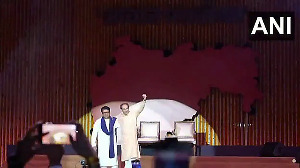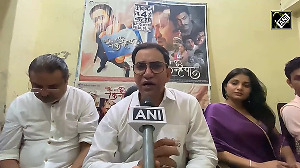'Shoma didn't have the luxury of time. She was already suffering from so many ailments.'

Professor Shoma Sen, among the first to be arrested in the Elgar Parishad case, got bail on April 5, after spending almost 6 six years in jail. Advocate Susan Abraham explains to Jyoti Punwani why the Nagpur professor should have been out more than 5 years ago.
The question everyone's asking is: If the Supreme Court has found no prima facie evidence against Shoma Sen, why did it take so long for her to get bail?
The high court should have granted her bail, but did not even hear the application, and told us to go back to the NIA court, because the NIA had filed a supplementary charge sheet.
This NIA charge sheet was filed nine months after Shoma had filed her bail application before the Bombay high court. This was the NIA's charge sheet against the other seven accused arrested by it in 2020, and did not have any new accusations against Shoma.
The high court order was passed on Janaury 17, 2023, after the bail application had remained pending before the court for more than three years, and well over four-and-a-half years after Shoma's arrest. This meant we'd have to go back to the trial court, where her bail had already been rejected on two previous occasions in 2018 and 2019.
Shoma should have been released in October 2018, along with the four others arrested with her: Sudhir Dhawale, Surendra Gadling, Rona Wilson and Mahesh Raut. There was a judgment by Justice Mridula Bhatkar on their application for default bail, which said that the Special (UAPA) Court Pune, should not have allowed extension of time to the prosecution to file a charge sheet after the mandatory 90-day period.
That extension had been obtained in violation of UAPA provisions.
When you have such a stringent law, then its implementation too should be stringent.
If the investigating officer files an application that he requires more than 90 days to file the charge sheet, the UAPA says that the public prosecutor has to give an independent report on whether he is justified in asking for more time.
1In the case in hand, the public prosecutor had just signed on the same application that the IO had made, but had not made an independent report.
When an accused is entitled to be released, and the prosecution denies such release by stating legal provisions, the court must scrutinise those claims minutely, to see that specious grounds are not being given.
You can take your time to file the charge sheet, but allow the accused to come out while you carry on your investigation. A stringent law must be stringent on the prosecution also.
On that basis, Justice Mridula Bhatkar passed her judgment quashing the order of the Special (UAPA) Court Pune. (24.10.2018, in W.P. 4148/18 Adv Surendra Gadling and Ors Vs State of Maharashtra, Bombay High Court Justice M. Bhatkar orders quashing extension order dtd 02.09.2018 of 90 days to file chargesheet granted by Sessions Judge, Pune.)
But the state of Maharashtra immediately went into appeal, and a three judge bench led by Chief Justice (Ranjan) Gogoi set aside the high court judgment, which, significantly, was based on a previous 5-judge judgment by the Supreme Court.
Till then, we had the Hitendra Thakur judgment as a precedent (for matters where an extension was sought for filing a charge sheet). The Supreme Court created a new precedent to deny bail.
Isn't this a travesty of justice? There's a lack of consistency, no sticking to principles that have prevailed so far.
After the NIA took over the case in January 2020, another battle of appeals had to be waged. Then came the Covid lockdown. That's why all our bail appeals have been delayed.

Hasn't the Supreme Court order granting Shoma Sen bail also criticised the Bombay high court?
Yes, it has.
The Supreme Court does say in its order that the high court could have exercised its jurisdiction to look into the NIA supplementary charge sheet.
There was nothing that incriminating in the NIA charge sheet that warranted her custody.
How did you choose to appeal before the Supreme Court instead of going back to the NIA court?
We had to make a difficult choice. Some of us were of the opinion that we should try in the Supreme Court because Shoma didn't have the luxury of time. She was already suffering from so many ailments.
Fortunately, now Shoma has got bail on merit, so the others should benefit too.
 IMAGE: Advocate Susan Abraham Photograph: ANI/X
IMAGE: Advocate Susan Abraham Photograph: ANI/XHow do you account for the NIA's volte face in March that they no longer require Shoma's custody?
Justice Aniruddha Bose asked the additional solicitor general that you say the accused is charged with various offences but the investigation is complete. Do you still require the custody of this ill, elderly, prisoner? In terms of framing the Constitutional guarantee of freedom, what do you say?
The ASG said he was not personally against liberty, so he had no objection if she was freed.
The judge then asked him to get the say of the NIA. When it was put to them like that, the NIA had to give the same answer.
However, in their written arguments, they have strongly opposed her bail.
From this entire process, can a layperson conclude that everything depends on which Bench is hearing you?
There's a time honoured principle that the same Bench should continue to hear all matters related to one FIR, so that every time, one doesn't have to start from scratch. But that practice is not being followed.
Other established rules are also not operating. Look at the case of Mahesh Raut and Gautam Navlakha. They got bail from the high court in September 2023 and December 2023 respectively. But stays were was granted which have been repeatedly extended by the Supreme Court. They have still not been released.
Feature Presentation: Aslam Hunani/Rediff.com











